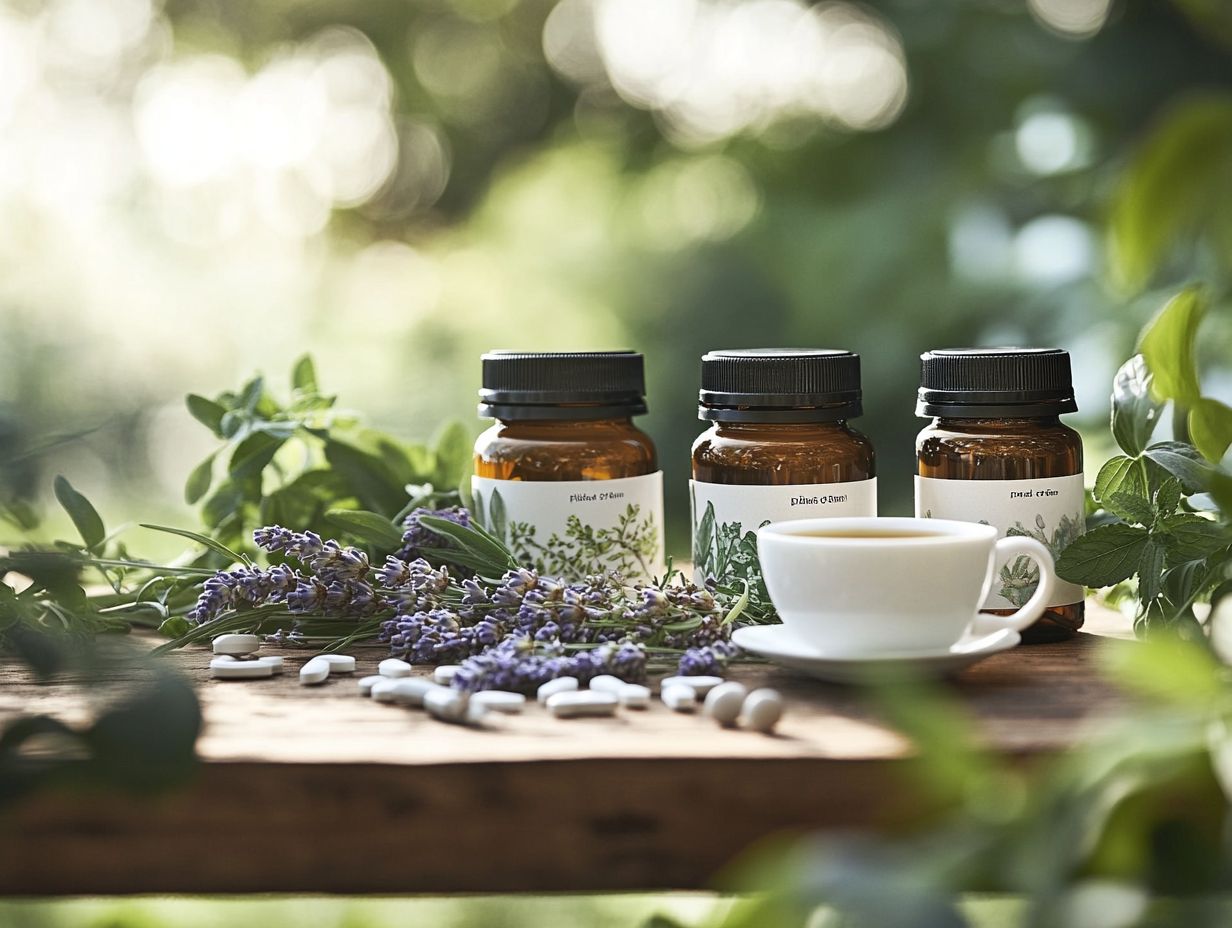5 Dietary Supplements That May Help with Anxiety
Feeling overwhelmed by anxiety? You’re not alone! Millions struggle with constant worry, but there are ways to find relief.
Anxiety impacts millions of individuals, fostering a persistent and often overwhelming sense of worry and fear.
While traditional treatments are available, many people are now seeking natural remedies to ease their symptoms.
This article delves into five dietary supplements Omega-3 fatty acids, Ashwagandha, Valerian root, B vitamins, and Magnesium that may assist in managing anxiety.
It also provides insight into what anxiety is, along with its symptoms and causes, highlighting how these supplements can contribute to overall mental wellness.
Are you prepared to explore natural solutions for anxiety relief? Don’t wait! Discover how these natural supplements can help you regain control over your anxiety today!
Contents
- Key Takeaways:
- 1. Omega-3 Fatty Acids
- 2. Ashwagandha
- 3. Valerian Root
- 4. B Vitamins
- 5. Magnesium
- What Is Anxiety and How Can It Be Managed?
- What Are the Symptoms of Anxiety?
- What Are the Causes of Anxiety?
- How Can Dietary Supplements Help with Anxiety?
- What Are the Risks and Side Effects of Taking Dietary Supplements for Anxiety?
- What Are Some Other Natural Ways to Manage Anxiety?
- When Should One Seek Professional Help for Anxiety?
- Can These Supplements Be Used as a Replacement for Medication?
- How Long Does It Take to See Results from Taking These Supplements?
- What Are Some Tips for Choosing the Right Dietary Supplements for Anxiety?
- Are There Any Dietary Restrictions When Taking These Supplements?
- Frequently Asked Questions
- What are the top 5 dietary supplements that may help with anxiety?
- How does ashwagandha help with anxiety?
- Can rhodiola rosea be used as a natural alternative to prescription anti-anxiety medication?
- What is L-theanine and how does it help with anxiety?
- Can magnesium deficiency contribute to anxiety?
- How can omega-3 fatty acids help with anxiety?
Key Takeaways:

- Omega-3 fatty acids, found in fish oil, may help reduce anxiety symptoms by promoting brain health and reducing inflammation.
- Ashwagandha, an herb used in traditional medicine, may help reduce stress and anxiety by promoting relaxation and reducing cortisol levels.
- Valerian root, a natural sedative, may help improve sleep and reduce anxiety symptoms by increasing GABA (gamma-aminobutyric acid), a chemical that helps calm the brain, levels in the brain.
1. Omega-3 Fatty Acids
Omega-3 fatty acids have garnered considerable attention for their potential to alleviate anxiety and enhance overall mental health.
Emerging evidence indicates that these essential nutrients can play an important role in managing anxiety disorders.
Clinical studies have shown a notable correlation between omega-3 intake and a reduction in physical symptoms of anxiety, highlighting the significance of a personalized approach to nutrition in mental health care.
Research from the Mayo Clinic reveals that individuals who consume higher amounts of omega-3s experience significant reductions in anxiety scores, underscoring how dietary choices can profoundly impact emotional well-being.
Findings from the American Psychological Association suggest that omega-3 supplementation may enhance the effectiveness of traditional anxiety treatments, including therapy and medication.
As with any supplement, it s crucial to discuss your omega-3 intake with a healthcare provider, particularly given potential side effects such as gastrointestinal discomfort and the risk of blood thinning. This collaborative approach ensures you receive tailored recommendations that align with your unique health needs.
2. Ashwagandha
Ashwagandha, a celebrated herb rooted in traditional Ayurvedic medicine, is steadily earning its place as a natural supplement for managing anxiety. It offers a complementary approach to conventional therapies that address mental health challenges.
Recent clinical studies, including those from Stanford University School of Medicine, suggest that this stress-relieving herb may effectively lower cortisol levels and enhance stress response in individuals.
Beyond its calming effects, ashwagandha has the potential to boost cognitive function and promote emotional well-being.
However, it s essential to consider potential side effects, such as gastrointestinal discomfort or interactions with certain medications. By incorporating this herbal remedy into a broader mental health strategy paired with lifestyle changes like exercise and mindfulness you could achieve more significant results, giving you the power to take charge of your mental wellness.
3. Valerian Root
Valerian root has long served as a natural remedy for anxiety and sleep disorders, providing a compelling alternative to conventional medications for those like you who prefer a holistic approach to mental health.
This ancient herb, revered since the times of the Greeks and Romans, is celebrated for its calming effects. You ll often find it featured in herbal formulations designed to alleviate tension and promote relaxation.
Many users discover that it not only enhances sleep quality but also effectively reduces symptoms of anxiety, making it a standout option in the realm of natural treatments.
Recent clinical studies have bolstered its reputation, highlighting its unique properties when compared to other supplements like chamomile or passionflower, which may not deliver the same level of relief.
By understanding its rich history and traditional medicinal applications, you can appreciate valerian root’s enduring appeal as a safe alternative for managing anxiety.
By exploring these natural supplements, such as the 5 dietary supplements to combat fatigue, you could find effective ways to manage anxiety. Always consult with your healthcare provider to tailor these options to your unique needs.
4. B Vitamins
B vitamins are essential nutrients that play an important role in maintaining your mental health. Research shows just how important they are in reducing anxiety symptoms and enhancing overall emotional well-being.
Among these vital B vitamins, B6 stands out for its effectiveness in alleviating anxiety. Studies reviewed by the Mayo Clinic emphasize that vitamin B6 is crucial for the chemicals in your brain that help control your mood, which may lessen feelings of anxiety.
B12 is also important for nerve health; a deficiency in this vitamin can lead to heightened anxiety and depressive symptoms. Experts from the American Psychological Association stress that a balanced intake of these vitamins not only supports cognitive function but also potentially boosts your emotional resilience, making them critical in your mental health nutrition toolkit.
5. Magnesium
Magnesium is a crucial mineral, renowned for its involvement in various bodily functions. A deficiency in magnesium has been linked to heightened anxiety levels and a range of physical symptoms, making it a critical element of a balanced diet for mental health.
Recent clinical studies indicate that insufficient magnesium may disrupt neurotransmitter functioning, contributing to increased anxiety. This highlights its significance in overall emotional well-being.
Experts agree that magnesium plays a vital role in regulating the body s stress-response system. If you re grappling with anxiety, enhancing your dietary choices or considering supplementation may offer relief.
Incorporating magnesium-rich foods, such as:
- leafy greens
- nuts
- seeds
- whole grains
into your meals can provide a natural source of this essential mineral! For those who find it challenging to meet their magnesium needs through diet alone, supplements can serve as a viable alternative, often resulting in reduced anxiety symptoms and fostering a greater sense of calm.
What Is Anxiety and How Can It Be Managed?

Anxiety is a multifaceted mental health condition that can take many forms, including generalized anxiety disorder (GAD) and panic disorder. It significantly affects your daily life, necessitating a personalized approach to management.
This often includes a blend of traditional therapies and innovative supplements aimed at alleviating symptoms and enhancing your overall well-being. This psychological state is marked by excessive worry, fear, and physical symptoms that can interfere with daily functioning.
You might experience social anxiety, characterized by a fear of social interactions, or obsessive-compulsive disorder (OCD), which involves intrusive thoughts and repetitive behaviors. Management strategies are diverse; you could explore a type of therapy that helps change negative thought patterns and mindfulness practices.
Moreover, lifestyle changes such as regular exercise, a balanced diet, and sufficient sleep can dramatically improve your mental health. Recognizing that each person’s experience with anxiety is unique highlights the importance of adopting tailored strategies that align with your individual needs, all supported by clinical evidence.
What Are the Symptoms of Anxiety?
The symptoms of anxiety can manifest in a multitude of ways, ranging from physical signs like an increased heart rate and muscle tension to psychological effects, such as excessive worry and difficulty concentrating.
You may find yourself ensnared in a cycle where physical discomfort amplifies your mental strain. For example, a racing heart could escalate feelings of fear or dread, creating a feedback loop that intensifies both your mental and physical experiences of anxiety.
Clinical experts highlight that symptoms like sweating, shaking, or feeling faint are common physical responses tied to heightened anxiety levels. On the psychological front, persistent feelings of apprehension and unease can disrupt your daily life, making even the simplest tasks feel daunting. This underscores the significant impact anxiety can have on your quality of life.
What Are the Causes of Anxiety?
Anxiety can spring from various factors, such as genetic predisposition, environmental stressors, and imbalances in brain chemistry. Understanding this complexity requires a personalized approach to truly address the root causes of this mental health issue.
Research suggests you may inherit traits that heighten your susceptibility to anxiety disorders, illustrating how biology intricately weaves into your personal history. Psychological factors, like past trauma or adverse childhood experiences, add further layers to your emotional landscape. Environmental influences can also intensify your symptoms, including socio-economic pressures or significant life changes.
Studies reveal these elements interact dynamically, often creating a compounded effect unique to each individual. Grasping this intricate interplay is essential for developing effective treatment strategies specifically tailored to meet your needs.
How Can Dietary Supplements Help with Anxiety?
Dietary supplements, including natural options like omega-3 fatty acids and ashwagandha, hold significant promise in alleviating anxiety. For those looking to improve their overall well-being, consider exploring 5 dietary supplements for better sleep quality that can also support mental health in various ways.
Recent clinical studies highlight these supplements’ potential to not only reduce symptoms but also enhance your overall well-being. For instance, research indicates that omega-3 fatty acids can play a crucial role in affecting brain chemicals, which may directly impact your mood regulation. Meanwhile, ashwagandha has been shown to lower cortisol levels a hormone closely linked to stress contributing to a more tranquil state of mind.
Experts often recommend using these supplements alongside traditional therapies like cognitive-behavioral therapy a form of therapy that helps change negative thought patterns. This creates a more holistic approach to managing anxiety and fostering mental resilience.
What Are the Risks and Side Effects of Taking Dietary Supplements for Anxiety?
While dietary supplements can provide benefits for managing anxiety, be aware of potential risks and side effects, as individual responses can vary significantly. It’s vital to consult a healthcare provider before starting any new supplement, especially those like the 5 dietary supplements for cognitive function!
Some common side effects linked to popular anxiety supplements include gastrointestinal disturbances, drowsiness, and possible interactions with other medications. For example, omega-3 fatty acids might leave you feeling bloated, while valerian root could induce fatigue. Additionally, certain herbal supplements might influence hormonal levels or trigger allergic reactions in sensitive individuals.
Given the unique complexities of your health status and medication regimen, seeking professional guidance can be invaluable in mitigating potential adverse effects. This approach promotes both safety and efficacy in managing your anxiety.
Ultimately, making informed decisions can enhance your ability to manage anxiety symptoms effectively while safeguarding your overall well-being.
What Are Some Other Natural Ways to Manage Anxiety?
In addition to dietary supplements, a wealth of natural approaches is available for managing anxiety, including mindfulness practices, exercise, and 5 dietary supplements to boost mental clarity. These methods beautifully complement traditional therapies.
These approaches aim not only to alleviate symptoms but also to foster overall well-being, encouraging you to weave healthier habits into your daily life. For example, embracing regular physical activity is linked to the release of endorphins those delightful hormones that can naturally elevate your mood and diminish feelings of anxiety.
Practicing mindfulness techniques, such as meditation or deep-breathing exercises, has shown remarkable promise in bolstering emotional resilience. Herbal remedies, like chamomile and kava kava, have also gained recognition, with clinical studies suggesting they may effectively lower anxiety levels.
Experts often advocate for a holistic approach, encouraging you to explore various combinations of these natural methods to find what resonates best with you.
When Should One Seek Professional Help for Anxiety?

Recognizing when to seek professional help for anxiety is vital, particularly when symptoms feel overwhelming or disrupt your daily life. Mental health professionals can offer tailored treatment options that blend conventional and complementary approaches just for you.
While it’s normal to experience occasional anxiety due to stressors like work deadlines or personal challenges, persistent feelings of unease that linger for weeks especially when paired with physical symptoms like heart palpitations or notable changes in sleep patterns might indicate a deeper issue.
Experts generally agree that if anxiety consistently prevents you from engaging in daily activities or forming relationships, don t hesitate to seek help! Timely intervention not only aids in recovery but also equips you with effective coping strategies, paving the way for a healthier and more balanced life.
Can These Supplements Be Used as a Replacement for Medication?
The question of whether dietary supplements can replace medication for treating anxiety is complex. While some dietary supplements for reducing inflammation might alleviate symptoms, they should not be viewed as substitutes for clinically prescribed treatments without professional guidance.
This complexity arises because individuals experience varying degrees of effectiveness. You may find relief through natural remedies like omega-3 fatty acids, magnesium, or herbal options such as ashwagandha and chamomile.
Traditional medications, like selective serotonin reuptake inhibitors (SSRIs) and benzodiazepines, come with established efficacy backed by extensive research and clinical trials. It s essential for you to engage with healthcare providers who can tailor recommendations to your unique situation.
By integrating supplements cautiously, with professional consultation, you can create a balanced approach that combines both natural and medical treatments in managing anxiety.
How Long Does It Take to See Results from Taking These Supplements?
The timeline for experiencing results from dietary supplements designed to relieve anxiety can vary significantly from person to person. Factors such as the type of supplement, dosage, and your unique response all play a role.
For example, you might begin to notice effects from omega-3 fatty acids in just a few weeks. Some studies suggest that improvements in mood and anxiety symptoms can start to appear around four to six weeks of consistent intake.
On the other hand, ashwagandha may require more patience; clinical trials research studies that test how well treatments work indicate potential benefits may emerge after about eight weeks of regular use.
Remember, your journey to relief starts with patience and consistency! While some individuals may feel relief sooner, others might need more time to experience significant changes. Seeking personalized guidance from a healthcare professional is always a wise choice.
What Are Some Tips for Choosing the Right Dietary Supplements for Anxiety?
Choosing the right dietary supplements for anxiety requires careful thought about factors like ingredient quality, dosage, and your specific health needs. Exploring 5 popular dietary supplements and their benefits allows for a truly personalized approach to managing your mental well-being.
To navigate this process effectively, start by examining product labels closely; they contain essential information about the ingredients and their concentrations. It s crucial to seek out certifications from reputable organizations, which indicate that the supplement meets high-quality standards.
Delving into the background of each ingredient can uncover potential benefits and side effects, giving you the power to make informed decisions. Consulting a healthcare provider is equally important, as they can provide tailored advice based on your health history and current medications.
This ensures that any supplement you choose fits seamlessly into your overall treatment plan. Talk to your healthcare provider today about the best supplement options for you!
Are There Any Dietary Restrictions When Taking These Supplements?
When considering dietary supplements for anxiety, pay close attention to your dietary restrictions; they are key to ensuring supplements work effectively. Understanding these restrictions is crucial as they can impact the effectiveness of the supplements or interact with medications or health conditions.
This becomes even more important if you manage chronic health issues or are on prescription medications. Certain supplements can interfere with drug absorption or alter how medications function in your body. If you have specific allergies or intolerances, always check ingredient lists carefully. If you’re on blood thinners, be aware that some herbal remedies may pose risks.
What works wonders for one person might not be suitable for you. Don’t hesitate to talk to your healthcare provider! It s essential to find what works best for you. They can provide insights into the appropriateness and safety of specific supplements, ensuring you adopt a comprehensive approach to managing anxiety.
Frequently Asked Questions
What are the top 5 dietary supplements that may help with anxiety?

The top 5 dietary supplements for stress relief that may help with anxiety are: ashwagandha, rhodiola rosea, L-theanine, magnesium, and omega-3 fatty acids.
How does ashwagandha help with anxiety?
Ashwagandha is a natural plant that helps the body manage stress. Used in Ayurvedic medicine for centuries, it helps reduce anxiety by regulating the body’s stress response and promoting a sense of calmness and relaxation.
Can rhodiola rosea be used as a natural alternative to prescription anti-anxiety medication?
Rhodiola rosea is often used as a natural alternative to prescription anti-anxiety medication because it can improve mood, decrease anxiety, and enhance cognitive function. However, consulting with a healthcare professional before making any changes to your medication regimen is important.
What is L-theanine and how does it help with anxiety?
L-theanine is an amino acid commonly found in green tea. It promotes relaxation and reduces stress and anxiety levels by increasing the production of GABA, a neurotransmitter that helps regulate mood.
Can magnesium deficiency contribute to anxiety?
Yes, magnesium deficiency has been linked to increased anxiety and stress levels. Supplementing with magnesium can help calm the nervous system and promote relaxation.
How can omega-3 fatty acids help with anxiety?
Omega-3 fatty acids, specifically EPA and DHA, positively affect mood and may help reduce symptoms of anxiety. They also have anti-inflammatory properties, which can benefit overall brain health and function.






